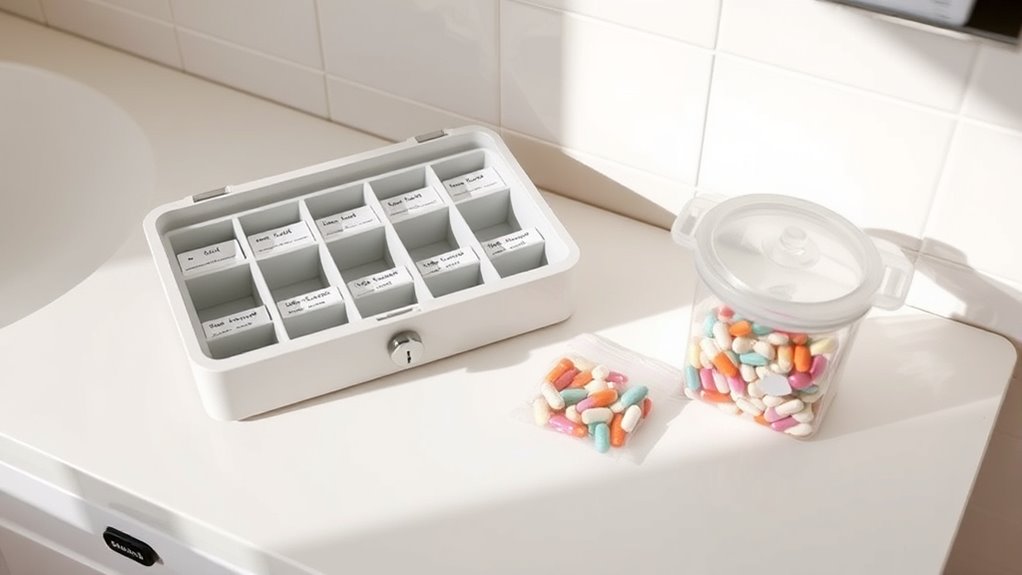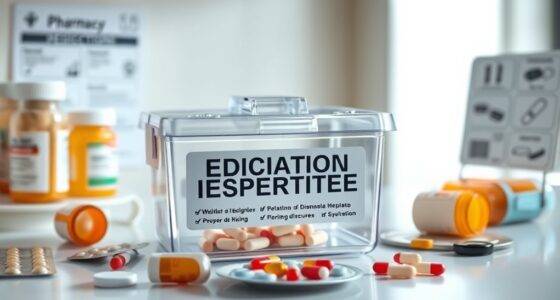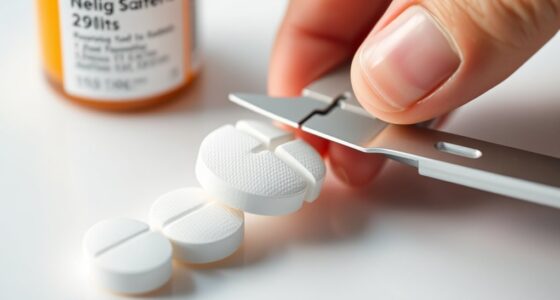To keep your medications safe, store them in a cool, dry place away from sunlight, out of reach of children and pets, and clearly label containers or organizers for quick access. Regularly check expiration dates and dispose of expired drugs properly using local take-back programs or FDA guidelines, avoiding flushing medications unless instructed. Maintaining an organized system and following these best practices will help protect your household and the environment—continue to explore how to do this effectively.
Key Takeaways
- Store medications in a cool, dry place away from sunlight and out of reach of children and pets.
- Use clearly labeled containers or organizers for easy identification and safety.
- Regularly check and dispose of expired or unused medicines following FDA and community guidelines.
- Avoid flushing medications; utilize take-back programs or mix with undesirable substances for trash disposal.
- Educate household members on proper storage and disposal practices to ensure safety and prevent misuse.

Proper storage and disposal of medications are essential steps in protecting your health and preventing drug misuse. When it comes to medicine cabinet organization, keeping your medications neatly arranged is more than just tidiness—it’s a vital safety measure. You should regularly check your medicine cabinet to verify that expired or unused drugs are removed. Store medications in a cool, dry place away from direct sunlight, and keep them out of reach of children and pets. Using clearly labeled containers or organizers can help you quickly identify what you have and avoid accidental ingestion. Proper medication storage reduces the risk of medication errors, prevents accidental overdose, and guarantees that you use your medicines safely. Additionally, understanding medication safety practices can further enhance your household’s protection.
Equally important is understanding proper medication disposal methods. Never flush medications down the toilet or sink unless specifically instructed, as this can contaminate water supplies. Instead, take advantage of local take-back programs, which are designed to dispose of drugs safely and environmentally responsibly. Many pharmacies, law enforcement agencies, and community centers offer medication take-back events or drop boxes. If no such options are available in your area, follow the FDA’s guidelines for disposing of medications in household trash. Mix unused pills with undesirable substances like coffee grounds or cat litter, place the mixture in a sealed plastic bag, and throw it away. This prevents accidental ingestion and reduces the chance of misuse by others.
You should also be vigilant about medication expiration dates. Expired medicines can lose their effectiveness or become unsafe to use. Regularly check your medications and dispose of any that are past their expiration. Keep a list of the medicines you have, and review it periodically to avoid accumulating unused or expired drugs. Proper medication disposal methods are vital because they help prevent medication theft, misuse, and environmental harm. Many communities now provide confidential disposal options, making it easier for you to do the right thing.
In addition, educating yourself and family members about medication safety can go a long way. This includes understanding how to store medicines securely and knowing the correct procedures for disposal. By maintaining an organized medicine cabinet and following proper disposal methods, you’re taking proactive steps to safeguard your health and the health of those around you. Remember, safe storage and responsible disposal are simple yet powerful ways to prevent medication misuse and protect the environment.
Frequently Asked Questions
Can I Store Medications in the Refrigerator?
Yes, you can store some medications in the refrigerator, but always check the medication’s label for proper storage instructions. Maintaining the correct medication temperature is vital for their effectiveness. Store medicines safely by keeping them in a designated spot, away from food and children. Follow storage safety guidelines, and avoid freezing or exposing medications to extreme temperatures unless specified. Proper storage guarantees your medications stay effective and safe to use.
How Do I Dispose of Expired Controlled Substances?
Imagine a teen finds expired controlled substances in a drawer. To prevent misuse, you should dispose of them properly. Take advantage of medication take-back programs or use proper disposal containers specifically designed for controlled substances. These methods guarantee safe removal, preventing environmental harm and misuse. Always follow local regulations, and never flush controlled substances unless instructed, to protect your community’s health and safety.
Is It Safe to Share Medications With Family Members?
You should never share medications with family members because it risks their health and safety. Medication sharing can lead to incorrect dosages, adverse reactions, or dangerous interactions. Always encourage family safety by keeping medications prescribed for you only. If someone needs help, they should see a healthcare professional instead of sharing or using someone else’s medication. Protect your loved ones by practicing responsible medication habits and never sharing prescriptions.
What Are the Risks of Keeping Medications in Unlocked Cabinets?
Ever leave your keys in the door and find your wallet gone? Keeping medications in unsecured cabinets poses similar risks. You could unintentionally harm children if they access dangerous drugs, or theft could become a concern. Unlocked cabinets compromise child safety and make theft prevention impossible. To avoid these issues, always store medications securely, out of children’s reach, and make sure your cabinets are locked—protecting your loved ones from harm and theft.
Are There Eco-Friendly Methods for Medication Disposal?
You can dispose of medications eco-friendly by participating in local recycling programs that accept pills and liquids. Additionally, utilize biodegradable packaging for disposal to reduce environmental impact. Some communities offer drug take-back events or designated drop-off sites, making it easy to safely discard unused medicines. Avoid flushing medications when possible, and always follow specific disposal instructions to protect the environment and prevent misuse.
Conclusion
By keeping your medications locked tight and tossing out leftovers properly, you’re the captain of your health ship, steering clear of dangerous storms. Think of your medicine cabinet as a treasure chest—you wouldn’t want it to fall into the wrong hands or become a hidden trap. When you store and dispose of medications responsibly, you’re planting seeds of safety that grow into a healthier, happier community. Your small actions can light the way to a safer tomorrow.









